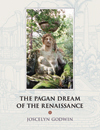 In the first chapter of The Pagan Dream of the Renaissance, Joscelyn Godwin writes of "a state of mind and soul that arose in fifteenth-century Italy, spread through Europe on certain clearly defined fault-lines, and persisted for about two hundred years, during which, although no one believed in the gods, many people acted as though they existed."
In the first chapter of The Pagan Dream of the Renaissance, Joscelyn Godwin writes of "a state of mind and soul that arose in fifteenth-century Italy, spread through Europe on certain clearly defined fault-lines, and persisted for about two hundred years, during which, although no one believed in the gods, many people acted as though they existed."Although these Medicis, Hapsburgs, other aristocrats, and the artists and craftsmen who created the paintings, sculptures, artificial grottos, fountains, temples, and all the other accouterments of this intellectual Paganism did not, in fact, claim to be other than good Catholics, in Professor Godwin's view, they "dreamed" of being Pagans.
In their waking life they accepted the absurdities acknowledged as the essence and credenda of Christianity, all the while nurturing a longing for the world of antiquity and a secret affinity for the divinities of that world.
That same dream underlies three of my favorite novels: John Crowley's Ægypt, Love & Sleep, and Dæmonomania, particularly the first.
And then what happened? Some historians cite the discovery and exploitation of the New World as turning Renaissance Europeans away from contemplation of an antique Golden Age and toward the exploitations of the Age of Exploration. The wars and intellectual struggles of the Reformation and Counter-Reformation took their tolls.
But the work was done. The hermetic texts were saved from the Islamic purge of Constantinople. Great art was created that lives today. The images of the gods were restored after a thousand years of Christian destruction; and as Pagans we know that "acting as if" is more important than "believing."
Tags: Joscelyn Godwin, Renaissance, Paganism



2 Comments:
So, Chas, is the implication here that after our minds were opened with the entheogenic experiences of the 1960s and 1970s, we too dreamed we were pagans and acted as if the ancient gods existed, as we went through our days as good little scientific empiricists? Because if you are, that's brilliant.
And what then will happen to us neopagans? Defeated by the Drug War and the unholy alliance of Fascists and Fundamentalist Christians?
Or perhaps this time the story will be different. This time we're less isolated, it is harder to control our communications, and we know more about power-over and how it destroys community.
Thanks for the book recommendations too.
Here I was just thinking about cultural conservation, but you have put an interesting twist on it.
I doubt we'll be defeated easily this time.
Chas
Post a Comment
<< Home